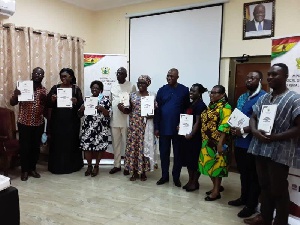The Ministry of Local Government and Rural Development (MLGRD) has launched a National Local Economic Development (LED) Policy and Action Plan to help accelerate socio-economic development and improve the livelihood of the people.
The policy would also accelerate decentralization and local governance for equitable, sustainable and balanced development.
Also, another document, known as the National Decentralization Policy and Strategy (NDPS), to facilitate the amendment of constitutional and legislative provisions that inhibit the principles of deepening local democracy and local political empowerment was out-door.
The two policies would span 2020 and 2024 and the European Union provided financial support under the Ghana/ European Union Decentralisation Programme.
Hajia Alima Mahama, Local Government Minister, who launched the Policy in Accra, explained that the LED, would specifically, deepened, local-level democracy and participation through the active involvement of citizens, and state and non-state actors in decision-making and plan implementation.
It would also improve the enabling environment for sustained business growth, create decent jobs and increased incomes, as well as enhance intergovernmental fiscal arrangements and financial management capacity at all levels of government.
She said the NDPS, on the other hand, would promote downward accountability, adding that the sector Ministry would develop a transformational plan to build a national consensus on local democracy and downward accountability.
The NDPS would support the implementation of change management and communication processes at all levels of governance to ensure that democratic decentralization becomes a reality.
The two policies would, therefore, guide the general development at the District level in partnership with other development-oriented organizations which included the Private Sector, Civil Society Organizations, Development Partners and other non-state actors.
Hajia Mahama said the Metropolitan, Municipal and District Assemblies (MMDAs) would provide credible roles and responsibilities in promoting the LE.
She said it was well-structured decentralization as the policies had provided a well-coordinated and democratic local initiative which engaged all stakeholders while recognizing formal and informal economies in developing the districts.
“As a Nation, we have come to the realization that LED creates wealth, increases employment, and incomes and promotes equitable and sustained economic growth,” she said.
She said a LED practitioner manual had been developed to assist MMDAs to develop and implement local economic development strategies.
She said the manual focuses on an innovative approach to LED by orienting MMDAs, enabling them to be economically focused while perusing their socio-political interventions.
“I am optimistic that the implementation of the reviewed policy would ensure effective mainstreaming of LED into the Medium Term Development Plans of the MMDAs to fully harness the economic potentials of the districts,” she added.
Click to view details



General News of Friday, 18 December 2020
Source: GNA

















